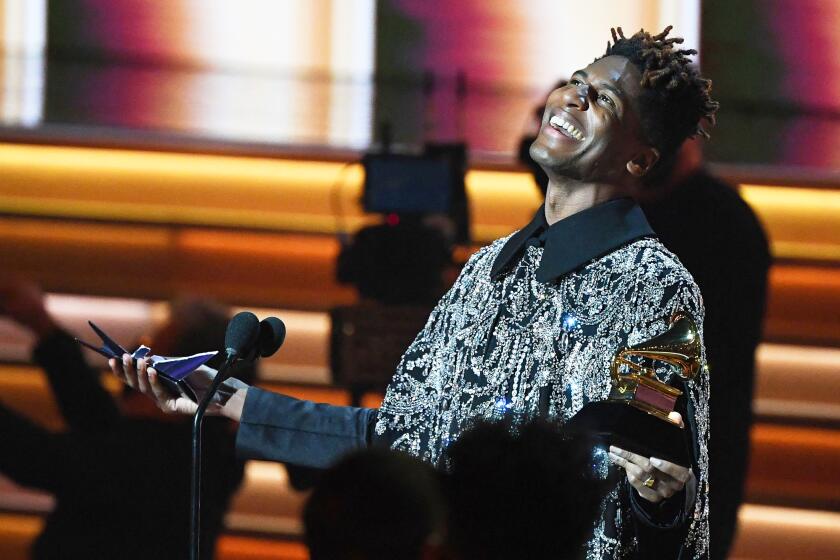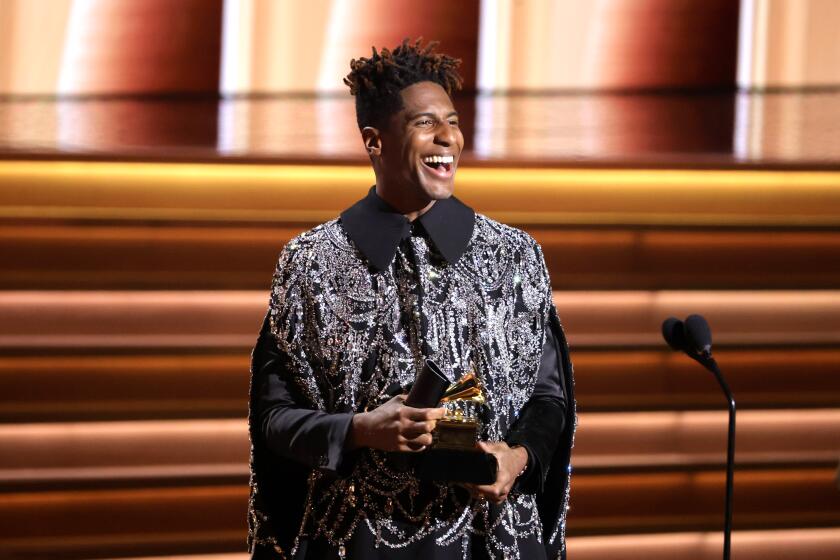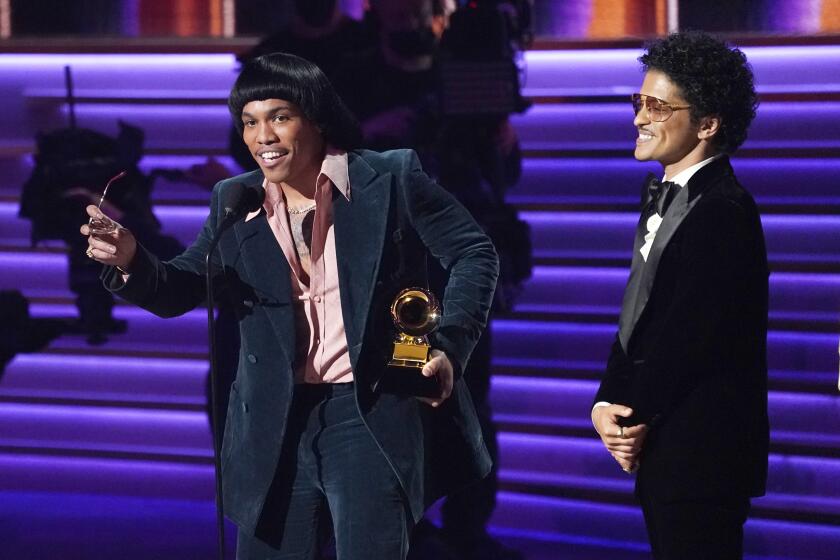How to win the Grammys? Make old sounds new again
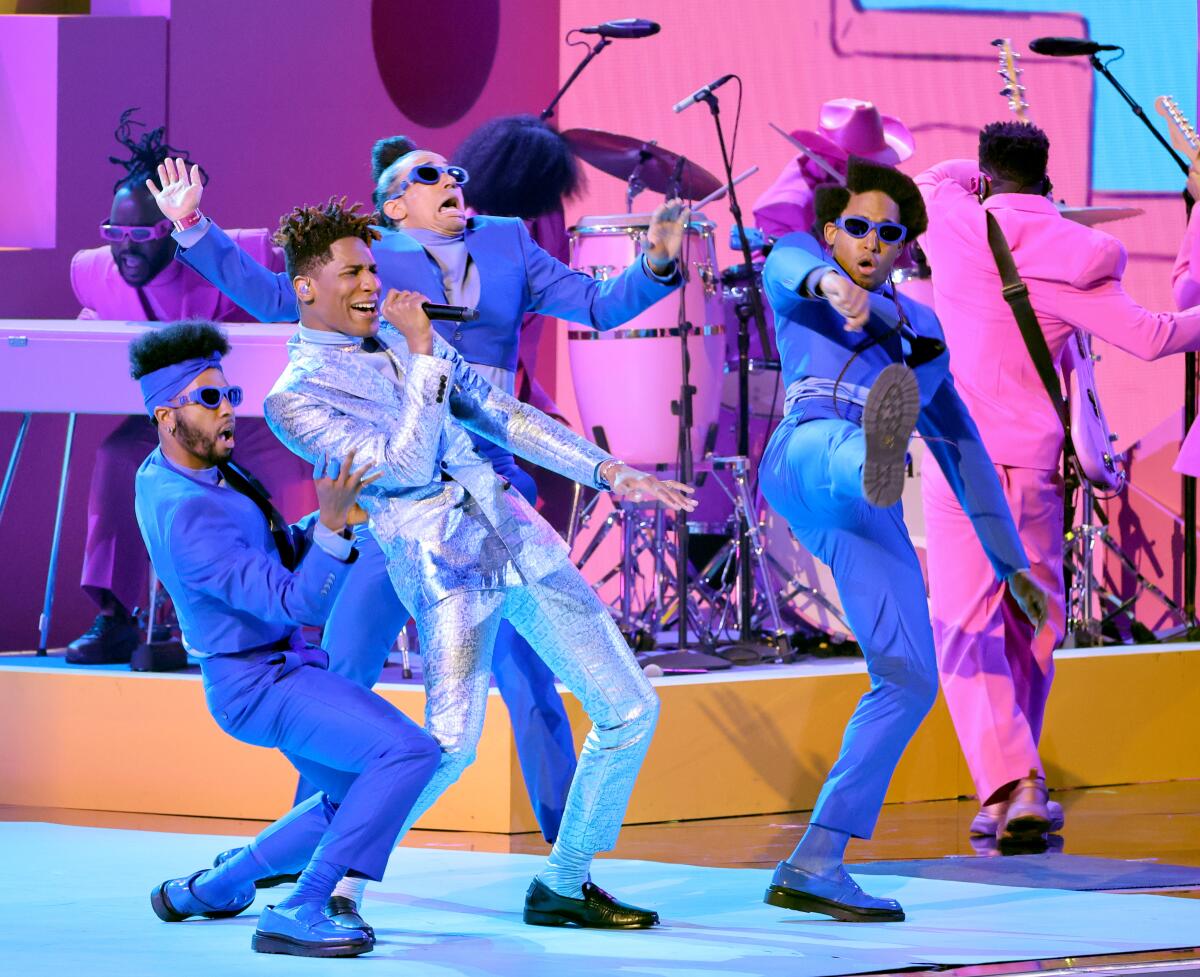
- Share via
Throwback resplendent in a dark velvety suit and a shirt unbuttoned to the point of parody, Anderson .Paak sauntered up to the stage near the end of Sunday night’s 64th Grammy Awards like a cat toward a bowl of milk.
“We are really trying our hardest to remain humble at this point,” he purred as he clutched the trophy for record of the year — the fourth prize he and his buddy Bruno Mars had won (on four nominations) for “Leave the Door Open,” their lush 1970s-style soul ballad as the duo Silk Sonic. “But in the industry, we call that a clean sweep.”
Indeed they do. Yet why bother with humility? The Grammys, as .Paak and certainly Mars understand, exist precisely to reward music like Silk Sonic’s: lovingly played, exquisitely produced, rooted in tradition with just the slightest sprinkling of modernity to show that the old ways have been pondered and determined still to be useful.
Join The Times’ music team live from Las Vegas as we break down the 64th Grammy Awards, from the biggest winners to the most talked-about performances.
In other words, Silk Sonic was virtually guaranteed a good night at the MGM Grand Garden Arena in Las Vegas, where the Grammys decamped this year in a COVID-inspired move from the ceremony’s usual home in Los Angeles. Consider that the duo performed “Leave the Door Open” on the 2021 telecast, took record and song of the year (as well as R&B song and performance) on Sunday and will likely be back at the 65th Grammys with their debut LP, which came out after the eligibility cutoff for this year’s edition. Mars’ triumph in record means he’s now tied at three with Paul Simon as the category’s winningest artist.
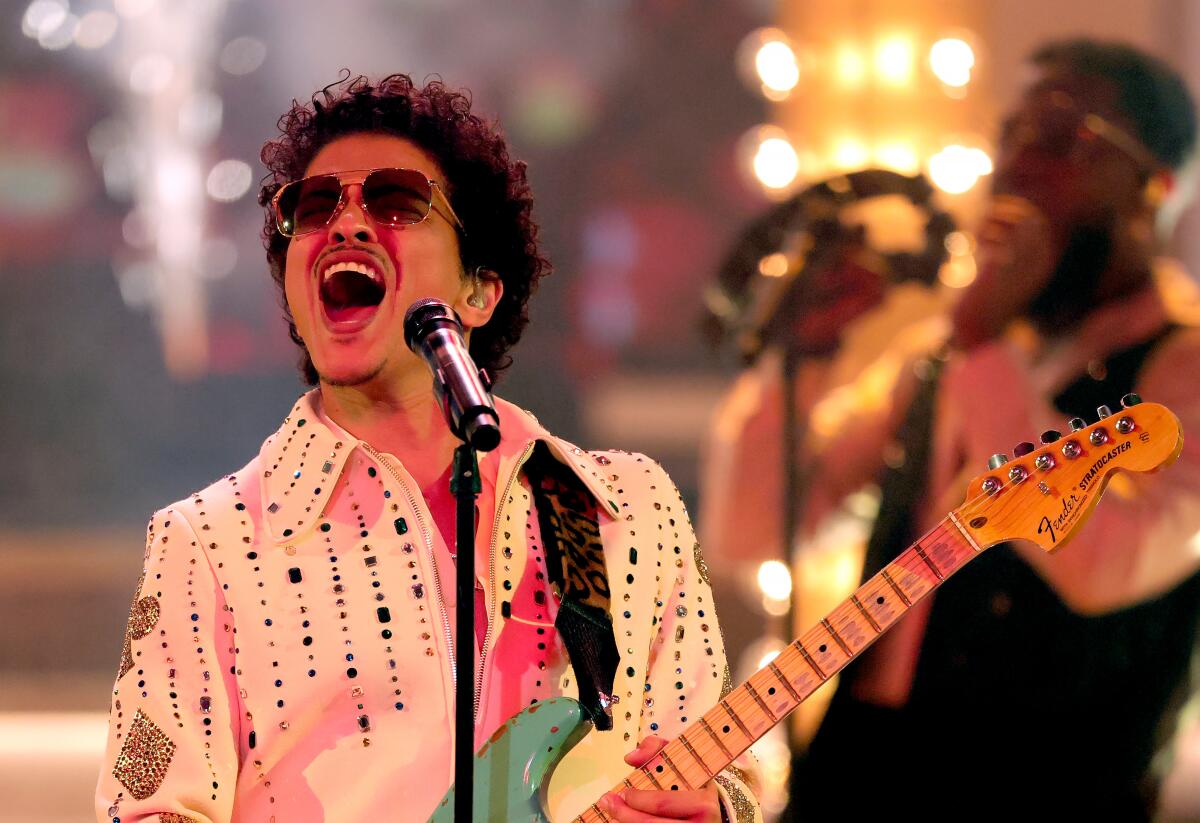
The Recording Academy, which presents the Grammys, especially loves Bruno Mars because — unlike so many of its historically minded faves — he’s popular with actual music fans. Voters can throw trophies at him without looking like they’re willfully ignoring Top 40 radio or streaming services like Spotify, whereas their choice Sunday for album of the year — “We Are” by the jazz and R&B composer and “Late Show With Stephen Colbert” bandleader Jon Batiste — suggests just that.
Any worries about raising that suggestion clearly weren’t enough to keep the Grammys from Grammy-ing with the shocking-but-not-surprising win for “We Are,” whose most-streamed track on Spotify has approximately 1/86th the number of plays as “Leave the Door Open.” And to an extent, that’s fine: The Grammys, as distinct from the zillion other awards shows vying for viewers’ ever-shrinking interest in them, are meant to celebrate skill, taste, wisdom, ingenuity. Sometimes those traits overlap with popularity; sometimes they don’t.
Grammys 2022 list of winners including Jon Batiste, Silk Sonic and Olivia Rodrigo
Also: It’s probably worth commending a show whose biggest victors — 19-year-old Olivia Rodrigo won the remaining of the Grammys’ major four awards in best new artist — span racial and generational lines in a way that could hardly be counted upon not so long ago. The academy has worked earnestly in recent years to diversify its voting pool of more than 11,000 recording professionals so that it more closely mirrors the industry it’s supposed to represent. But one reason an act like Batiste wins over the likes of Rodrigo, Doja Cat and Lil Nas X is because the academy is still filled — will always be filled — with engineers and arrangers and instrumentalists (and jazz and R&B musicians) who see what he does as a valuable, and perhaps endangered, form of art.
The problem for the Grammys is that artists for whom skill and ingenuity do overlap with massive popularity are beginning to wonder whether they too are valued. Every year, it seems another vital superstar joins the chorus of those uninterested in taking part in the academy’s rituals; this time, Drake — who’d been nominated for two rap awards — asked that his music be withdrawn from consideration, presumably because he felt he’d been sidelined from the major categories.
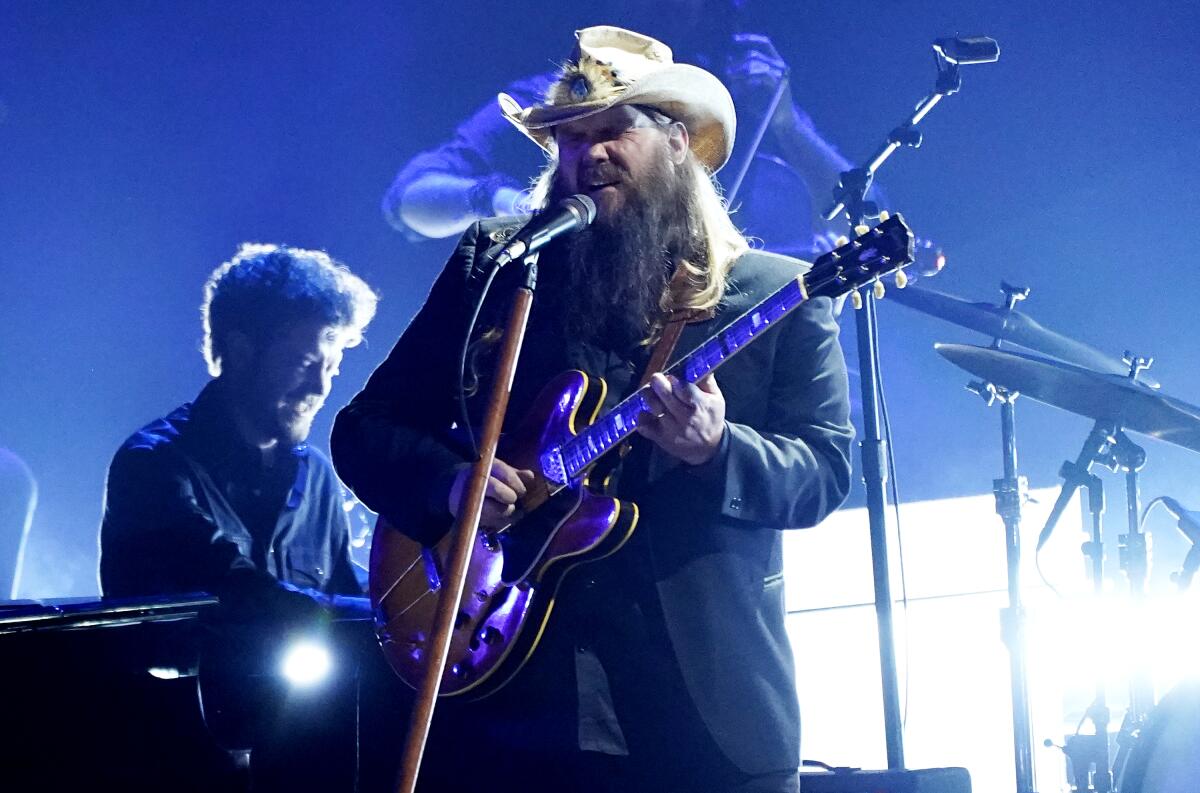
Though their reasons for skipping the show varied, the list of other top-tier acts not in the building Sunday was long and included Beyoncé, Ariana Grande, Harry Styles, Adele, Cardi B and Taylor Swift, as well as the Weeknd, who’s said he’ll never submit his work again after his blockbuster “After Hours” album was bafflingly shut out in 2021, and Kanye West, who was barred from performing (despite an album of the year nod for his “Donda”) as a result of his threatening behavior on social media.
It’s anyone’s guess whether West’s performance would’ve been any good. But for sure, his presence would’ve made the Grammys seem more in touch with hip-hop, which as it was was limited to only two performances: one from Lil Nas X and the other from Nas, who did a medley featuring important (if typically Grammy-overlooked) tracks from two decades ago.
There was something for everyone at this year’s Grammys, from socially uplifting R&B to teen singer-songwriter melodrama to smooth-as-silk ‘70s soul.
And yet the Grammys still exert a pull, not just among traditionalists like Brandi Carlile, H.E.R. and Chris Stapleton — all sang superbly in performances built on music played proudly by hand — but among young innovators who recognize perhaps that a bunch of trophies can help protect one’s creative freedom in the future. Rodrigo seized her moment early in the show with a searing rendition of her smash “Drivers License” that should’ve quieted anyone holding her Disney past against her; 20-year-old Billie Eilish, wearing a T-shirt emblazoned with the face of the late Taylor Hawkins, veered expertly from hushed folk to stormy rock in a sweet-and-sour “Happier Than Ever.”
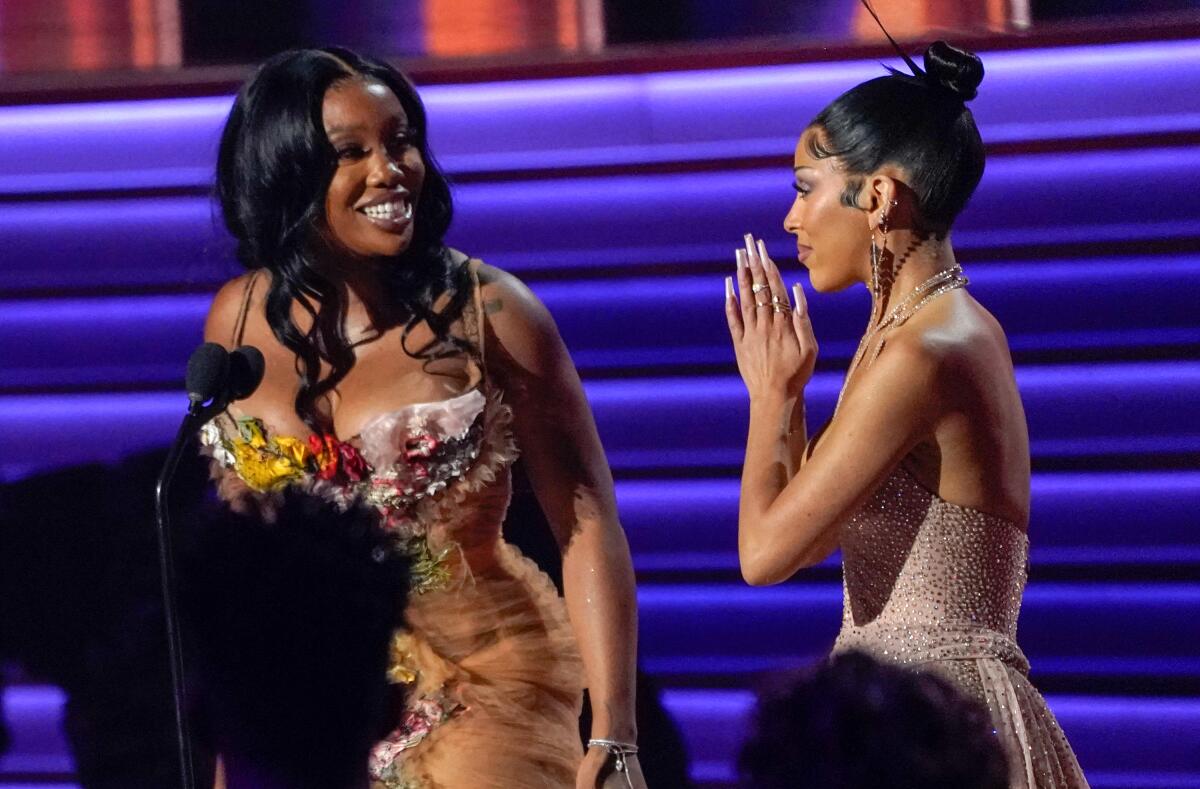
Even Doja Cat, the born-on-the-internet singer-rapper-provocateur, seemed overwhelmed by her and SZA’s winning pop duo/group performance for their duet “Kiss Me More.” “I like to downplay a lot of s—, but this is a big deal,” she said, a little bewildered under the spotlight — and a little breathless after having dashed back into the arena from an ill-timed trip to the ladies’ room.
That almost-mishap was about as scandalous as the Grammys got one week after Will Smith’s slap of Chris Rock upended the Oscars, leaving this show’s producers to wonder how they might create their own viral moment to justify the expense of live TV. (Overnight Grammys ratings registered a slight uptick from last year’s lowest-of-all-time viewership.) But then scandal isn’t really the Grammys’ go-to move: Particularly in years without an undeniable narrative such as Eilish’s breakout in 2020, when she swept all four major awards, the academy is drawn almost inexorably to cozy security-blanket music like Batiste’s and Silk Sonic’s. Not unlike Oscar voters who can’t get enough of movies about Hollywood, Grammy voters want to champion songs and albums that tell optimistic stories and cast the music industry in a positive light.
And if naming Batiste’s commercially irrelevant LP the album of the year misrepresents the true state of play in pop? Surely nobody would begrudge a marginal feel-good figure getting his day in the sun — except maybe the real centrists whom the Grammys keep pushing to the edges.
More to Read
The biggest entertainment stories
Get our big stories about Hollywood, film, television, music, arts, culture and more right in your inbox as soon as they publish.
You may occasionally receive promotional content from the Los Angeles Times.
